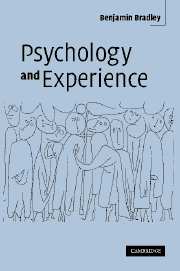Book contents
- Frontmatter
- Contents
- List of illustrations
- Preface
- Acknowledgements
- 1 Introduction
- 2 Learning from experience
- 3 From here to synchrony
- 4 What to make of coincidence
- 5 The topography of intersubjective space
- 6 The two axes of psychological explanation
- 7 Pictures of psychical change
- 8 Research among equals
- 9 Validating the curriculum
- 10 Conclusion
- List of references
- Index
1 - Introduction
Published online by Cambridge University Press: 22 September 2009
- Frontmatter
- Contents
- List of illustrations
- Preface
- Acknowledgements
- 1 Introduction
- 2 Learning from experience
- 3 From here to synchrony
- 4 What to make of coincidence
- 5 The topography of intersubjective space
- 6 The two axes of psychological explanation
- 7 Pictures of psychical change
- 8 Research among equals
- 9 Validating the curriculum
- 10 Conclusion
- List of references
- Index
Summary
The famous sentence of Socrates ‘Know thyself’, so celebrated by writers of antiquity, and said by them to have descended from Heaven, however wise it may be, seems to be rather of a selfish nature; and the author of it might have added ‘Know also other people.’
(Erasmus Darwin, 1803, The Temple of Nature or the Origin of Society, p. 124)A long glittering history buoys the idea that science is best based on experience. This idea is what inspires historians to claim modern psychology was born in the laboratories of the late 1800s. The very word empirical means ‘based on experience’, and it was the introduction of rigorous empirical methods that is most widely held to have delivered psychology from the primeval ooze of armchair speculation. But over time, as a direct consequence of psychology's success, the uses of the word experience have multiplied. Like any other empirical science, the word's first meaning was that psychologists' findings should be based on experience in the form of carefully collected first-hand evidence which, given the same circumstances, we could all ourselves experience and confirm. But experience is not just the foundation of psychology's method. It is also the main object of psychological research. Just as rocks and fossils are what geologists study, experience is what psychologists study. Their investigations cover everything from the parameters of pattern recognition and how rats' learn from electric shocks to the cognitive basis for visual illusions and why new mothers get depressed.
Information
- Type
- Chapter
- Information
- Psychology and Experience , pp. 1 - 16Publisher: Cambridge University PressPrint publication year: 2005
